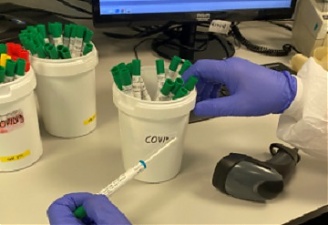Analytics, Covid-19, Estonia, EU – Baltic States, Legislation, Medicine, Transport
International Internet Magazine. Baltic States news & analytics
Friday, 13.02.2026, 05:22
1 in 200 people returning to Estonia test positive for coronavirus
 Print version
Print version |
|---|
Starting from Sept. 1, 2020 it is possible for people arriving in Estonia from COVID-19 at-risk countries to test for coronavirus at Tallinn Airport and at the passenger port to shorten the period of self-isolation and return to work earlier than after a period of 14 days
.
As at 10 a.m. on Sept. 15, 5,902 COVID-19 test samples had been taken from people arriving in Estonia and 31 of them, or approximately 0.52%, had returned a positive result, Gerly Kedelauk, head of marketing and communication at the company Synlab that conducts the tests, said.
According to the coronavirus information website Worldometers.info, altogether 175,110 tests have been taken in Estonia so far in 2020 and 2,722 of them, or 1.55%, have proved positive. Estonia deems as at-risk countries the countries where the infection rate per 100,000 inhabitants for the past two weeks is 16 or more.
According to the latest list of at-risk countries published by the Ministry of Foreign Affairs on Sept. 11, most countries of the world are defined as at-risk countries. Only people arriving in Estonia from Cyprus, Finland, Latvia, Liechtenstein, Lithuania or Vatican are not required to self-isolate after arrival in Estonia, provided that they did not take a connecting flight and made no stopover en route to Estonia.
The self-isolation requirement also does not apply to arrivals from Australia, Canada, Georgia, Japan, New Zealand, Rwanda, South Korea, Thailand and Uruguay, speaking of non-EU countries, and also provided that the passenger did not pass through an at-risk country en route to Estonia.
The people arriving in Estonia whose first test result was negative should test for a second time one week after arrival. According to Kedelauk, 1,364 such repeat tests had been analyzed by Sept. 15 and three of such tests, or 0.22%, had returned a positive result. Hence, approximately one in 450 of the returnees from at-risk countries whose first test returned a negative result tested positive in the repeat test.
Kedelauk added that the results of repeat tests taken on approximately 600 more people are expected in the coming few days.
It appears from the figures that not all people who tested on the border upon arrival in Estonia have taken a repeat test.
"Since the people arriving from at-risk countries currently can choose between restricting their freedom of movement during two weeks and testing, not taking a test is altogether lawful," spokesman for the Health Board Simmo Saar said.
"It makes sense to take a repeat test primarily to confirm a negative result," Saar said, adding that in the case of a positive test result the person must go into isolation anyway and the decision that he or she has recovered is made not by the party that conducts the test, but the person's family doctor.
- 26.08.2021 LLC Dizozols Investments finalizes investment attraction deal with Crowdestor with record-high profits
- 30.12.2020 Hotels showing strong interest in providing self-isolation service
- 30.12.2020 EU to buy additional 100 mln doses of coronavirus vaccine
- 30.12.2020 ЕС закупит 100 млн. дополнительных доз вакцины Biontech и Pfizer
- 29.12.2020 В Латвии вводят комендантский час, ЧС продлена до 7 февраля
- 29.12.2020 Latvia to impose curfew, state of emergency to be extended until February 7
- 29.12.2020 Linde Gas открывает завод в Кедайняйской СЭЗ
- 29.12.2020 Number of new companies registered in Estonia up in 2020
- 29.12.2020 Президент Литвы утвердил бюджет 2021 года
- 29.12.2020 В Риге можно изолироваться в трех гостиницах








 «The Baltic Course» Is Sold and Stays in Business!
«The Baltic Course» Is Sold and Stays in Business!

